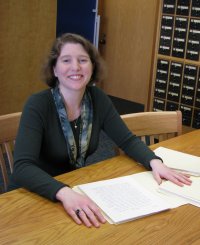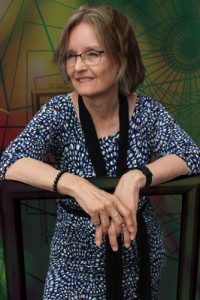Spotlight on Lynne M. Thomas, Archivist
Lynne M. Thomas is the Head of Rare Books and Special Collections at Northern Illinois University in DeKalb IL, where she is responsible for popular culture special collections, including papers of SF authors, dime novels, and popular historical children’s literature. She co-authored Special Collections 2.0, a book about web 2.0 technologies and special collections in libraries with Beth Whittaker of the University of Kansas (Libraries Unlimited, 2009), and co-edited Chicks Dig Time Lords, an essay collection celebrating women in Doctor Who fandom and the production of the series (Mad Norwegian Press, 2010).
I help to build the historical record for SF literature, by ensuring that the story of how writers, publishers, and editors create and sell their work survives and remains visible. I also try to document the fan community, since that shows us how the reactions to this creative work shift and change over time. The biggest change in our field in the past 30 years is the growing amount of electronic documentation in addition to paper materials. To completely document the genre, libraries like mine are now actively working to preserve both formats as part of their mission.
Why the focus on SF/fantasy?
Our library has been a “research collection” depository for the SFWA Circulating Book Plan since 1979, so we have been collecting SF books for decades. When I became Curator in 2004, the acquisition of SF author archives was a logical place to focus on expanding that collection. I firmly believe that this genre is central to understanding cultural and literary history in the 20th and 21st centuries. My background is in literary scholarship, and it is difficult to truly study a field of literature when only the finished product survives, without the social context of its intellectual and physical production.
Who has donated papers to the archive?
There are 40 authors who have already donated papers. We currently hold the papers of Jack McDevitt, Elizabeth Bear, Sarah Monette, Tobias Buckell, Caroline Stevermer, Kage Baker, Tamora Pierce, Eric Flint, Jody Lynn Nye, David Weber, Robert Asprin, Sarah Prineas, Nnedi Okorafor, Catherynne M. Valente, Mary Robinette Kowal, Patricia Wrede, Will Shetterly, Tim Pratt, Heather Shaw, Alma Alexander, Sharon Shinn, Carol Emshwiller, and others. We also recently acquired the 20th World Science Fiction Convention Collection, which includes correspondence from a host of other authors. There are other authors with whom I am working that have committed to archiving at Northern Illinois University, or are considering it strongly, but I don’t make their names public until I have materials (either in paper or electronic form) in hand.
Are there any unusual or especially noteworthy items you’ve received for your archive? Any mummified cats or notebooks bound in human skin?
Nothing so glamorous or unusual as that so far, I’m afraid. The most unusual item that we’ve received is an unused “barf bag” from an author who made notes upon it during a cross-country flight. More interesting items may show up over time, since we are accepting archival materials a little at a time from working authors, in addition to taking whole collections all at once.
Is there anything else you’d like our readers to know about you or your work?
I think the most important thing is that you don’t have to be dead to be archived. Especially in the electronic age, when it’s far too easy to lose or delete files inadvertently, the sooner you speak to an archivist for the placement and ongoing preservation of your literary legacy, the better. If you’re curious about the primary materials I’m interested in collecting, I have brief guidelines on my blog: http://niurarebooks.blogspot.com/2010/02/what-do-you-want-exactly.html. We welcome support from fans and professionals, particularly in terms of gifts of books, archives, fanzines, and financial support to keep our collection growing and further the study of SF literature. For more information about our collections, please visit www.ulib.niu.edu/rarebooks/sciencefiction.cfm.



 Can you tell us about what you do as an archivist, and why it’s important?
Can you tell us about what you do as an archivist, and why it’s important?



Pingback:Tweets that mention Locus Online Perspectives » Spotlight on Lynne M. Thomas, Archivist -- Topsy.com